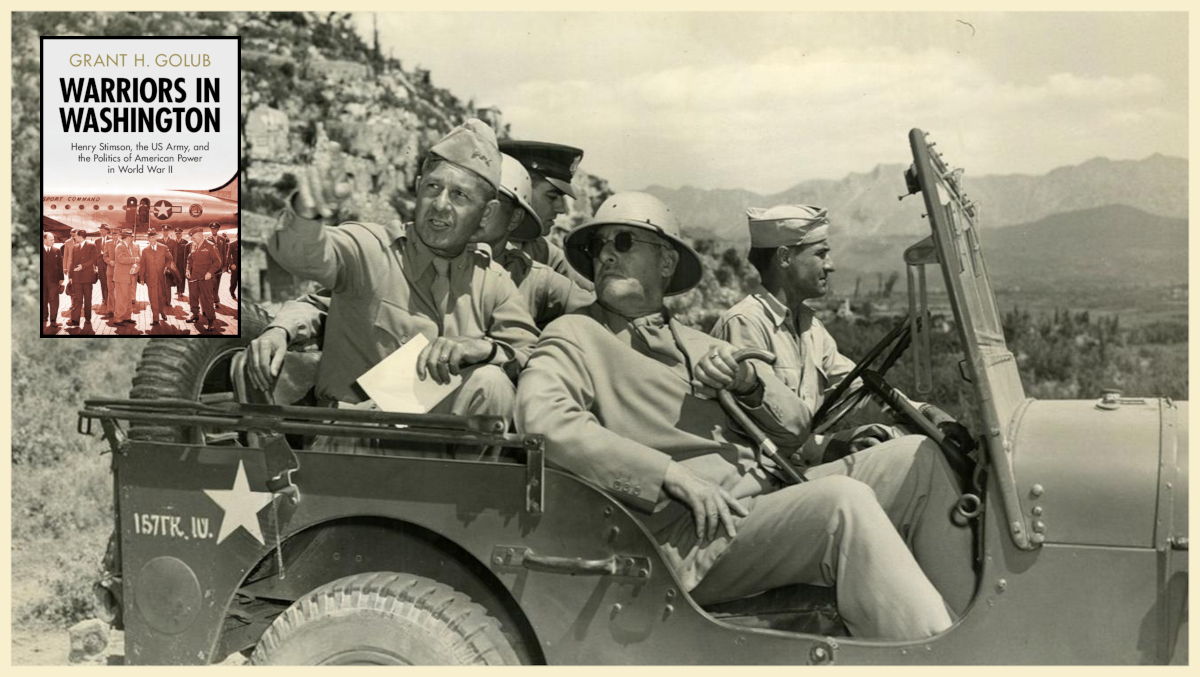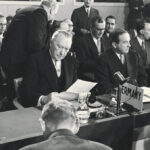
Author and U.S. Army War College Assistant Professor Grant Golub is in the studio with guest host Jadwiga Biskupksa to discuss his new book, Warriors in Washington: Henry Stimson, the US Army, and the Politics of American Power in World War II. Grant examines the role of Secretary of War Henry Stimson during World War II. He argues that Stimson and his team transformed the War Department from a dysfunctional bureaucracy into a powerful political actor and an energetic player in the Roosevelt administration. The book uses Stimson as a lens to explore the origins of the military’s rising influence over foreign policy. This transformation allowed Stimson to successfully push for a more interventionist foreign policy and secure a central voice for the Army in government decision-making.
Stimson is a big believer that if the United States wants to be a great power, you need to have a premier first class fighting force
Podcast: Download
Grant Golub is a assistant professor of American History in the Department of National Security and Strategy at the U.S. Army War College. He received his Ph.D. in International History at the London School of Economics and Political Science (LSE) and also holds additional degrees from Princeton University and LSE. He specializes in U.S. grand strategy, diplomatic and international history, the domestic determinants of American foreign policy, transatlantic relations, and how executive branch agencies shape U.S. strategy and policy. He is the author of Warriors in Washington: Henry Stimson, the US Army, and the Politics of American Power in World War II (Cambridge University Press 2025). He is also a Non-Resident Fellow at Defense Priorities, a Washington, DC foreign policy think tank.
Jadwiga Biskupska is associate professor of military history at Sam Houston State University and co-director of the Second World War Research Group, North America. She is the Harold K. Johnson Visiting Chair of Military History at the U.S. Army War College for AY26. She received her PhD from Yale University. Her first book, Survivors: Warsaw under Nazi Occupation (Cambridge University Press 2022), won the Heldt Prize and an honorable mention for the Witold Pilecki International Book Award.
The views expressed in this presentation are those of the speakers and do not necessarily reflect those of the U.S. Army War College, U.S. Army, or Department of Defense.
Photo Description: Lieutenant General Jacob L. Devers, Deputy Allied Commander, Mediterranean Theater, pointing out landmarks at devastated Cassino to Secretary of War Henry L. Stimson touring the Italian battlefront.
Photo Credit: Stoen / Army Pictorial Service. Cassino, Italy. 4 July 1944





Interesting episode. Stimson is a fascinating public servant and I too have had once or twice wondered more about him. I didn’t think the host’s snark added to the content. Perhaps she can be professional when she is in the host’s chair.
To better understand “war,” near the end of this podcast, and beginning at about the 41:00 point thereof, a suggestion is made that — while we look at what is happening on the “battlefield” — we should study more carefully what were/are the political objectives (for example, the political objectives of those in power in Washington at a particular time) — that drove/drive a particular strategy — and, thus, come to see the “battlefield” in comparison to same/from that exact such political objective perspective.
During the period of the Old Cold War (1946 – 1990?), might we say that the political objective — that drove our containment “wars” and strategy back then — this such political objective was to prevent the spread of communism. (The U.S. believing that by restricting the expansion of Soviet power and influence, the communist system would eventually crumble under its own inherent flaws?)
During the more recent period, of the New/Reverse Cold War (1990 – 2017), might we say that the political objective — that drove our expansionist “wars” and strategy most recently — this such political objective was the advancing, more throughout the world, of such things as capitalism, markets and democracy?
“Throughout the Cold War, we contained a global threat to market democracies; now we should seek to enlarge their reach, particularly in places of special significance to us. The successor to a doctrine of containment must be a strategy of enlargement — enlargement of the world’s free community of market democracies.” (From then-(1993) National Security Advisor Anthony Lake’s “From Containment to Enlargement” paper — which was the precursor to/the introduction to then-President Bill Clinton’s “Engagement and Enlargement” strategic document.)
This seems to beg the question: As to the “wars” that we might encounter/are encountering today and in the near future, what is/will be our political objective (not containment, not enlargement, but, rather, shrinkage/withdrawal/sharing of power/isolationism/self and internal fixing time?) that drives — and/or will drive — our strategy (articulate same) now and in the near future?
As to (a) the “war”/the “battlefield” and, re: same, (b) the need to look to and understand same via the political objectives of states and societies concerned (as discussed in my comment above); as to these such matters, might we need to consider:
a. Re: China and Taiwan, the following from the Amazon review of the book “Breaking the Engagement: How China Won & Lost America” by David Shambaugh:
“Shambaugh attributes the recent sharp deterioration of relations to a combination of China’s actions and American expectations. Xi Jinping’s increasingly assertive foreign policy and domestic repression has directly challenged American interests. More deeply, he argues that the real underlying cause is America’s longstanding paternalistic approach to transform China into a liberal state and society which conforms with the US-led global liberal order. When China has generally evolved in this direction― politically, economically, socially, intellectually, and internationally―it corresponds with American aspirations and the two could cooperate. But when Beijing pushes back against this transformative strategy―which Beijing sees as subversion―Americans become disillusioned and U.S. policymakers see China as a malign regime, which must be countered.” And:
b. Re: Russia and Ukraine, the following from the Just Security article “Putin’s Real Fear: Ukraine’s Constitutional Order” by Philip Bobbitt:
“It is Ukraine’s constitutional order — with its independent (though still troubled) judicial system, freedom of the press, multiparty politics, largely legitimate elections, vibrant civil society, and general respect for human rights — that Putin cannot tolerate, lest it provide too tempting an example for democratic activists in his own country who have vehemently opposed him at great risk to their lives and to the public in general that shares so many ties to the people in Ukraine. The “peaceful coexistence” of the Cold War is, in this respect, not acceptable to Putin.”
Question:
If both China and Russia consider — as “subversive”/as “subversion” — the long-standing political objective of the U.S. (re: their countries) to transform the Chinese and Russian states and their societies into liberal states and societies.
And if China and Russia see U.S. positions and efforts in Taiwan and Ukraine from that exact such “subversive”/”subversion” point of view,
Then, as to how things proceed on the “battlefields” that develop, re: the wars” which occur along these lines, must not these such matters, also, be considered from these exact same such political objectives and points of view?
Or, with the Trump presidencies, has the U.S. formally abandoned its long-standing “transformative” political objective re: China and Russia?
If so, then (a) what new U.S. political objectives “drive” our Chinese and Russian policies now, (a) what role, if any, does Taiwan and Russia play as to these such new U.S. political objectives and (c) how are these such new U.S. political objectives viewed by the Chinese and Russian regimes today?
Herein, our understanding of related “wars,” and the proceeding re: same on the various “battlefields” thereof, these needing to be informed by clear answers as to these such questions?